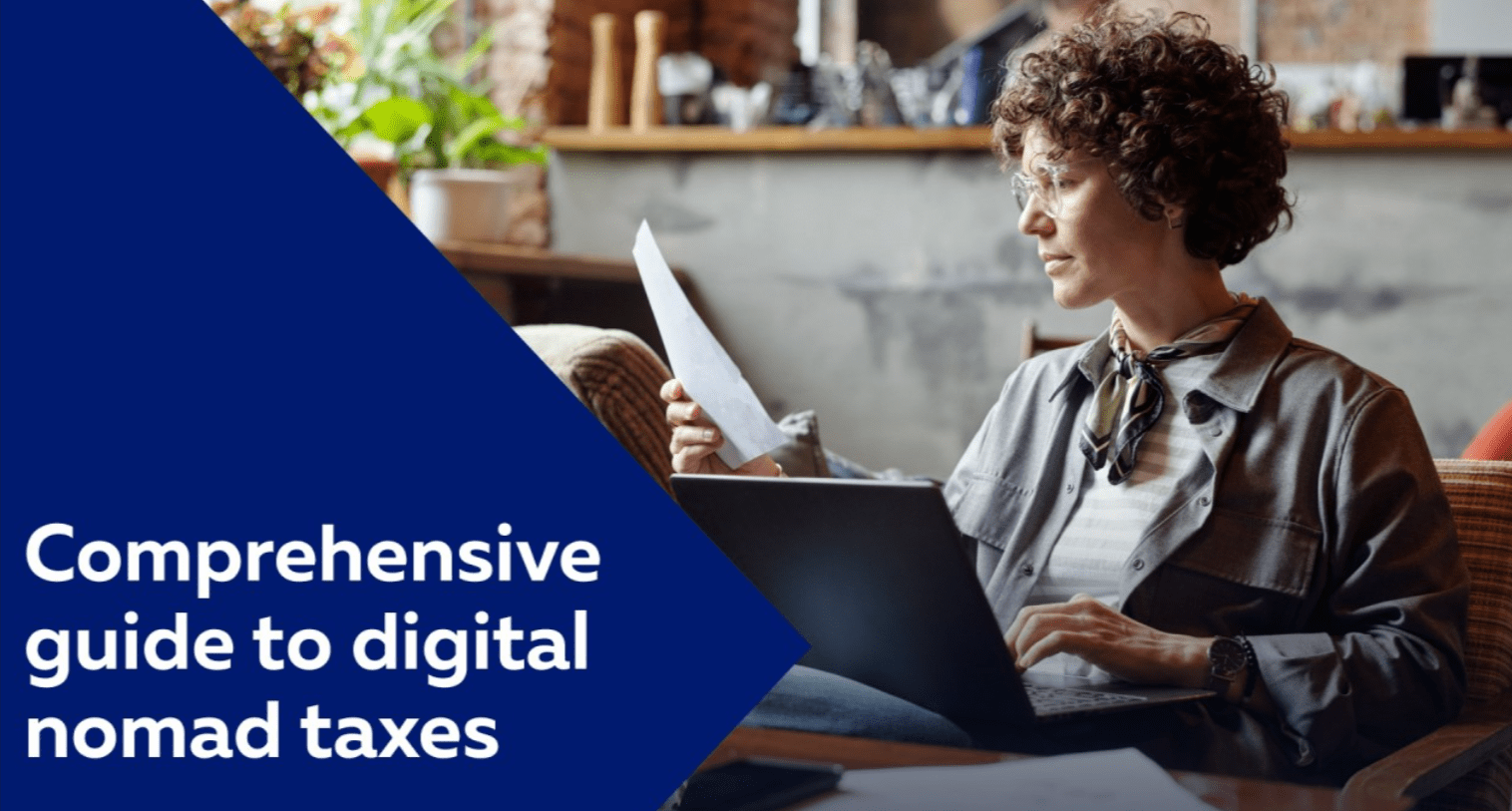How to Handle Taxes as a Digital Nomad

Living and working internationally can be exciting, but claiming taxes as a digital nomad can be one of the most complicated parts of it all. In contrast to the traditional employee, whose company withholds taxes from their paycheck, digital nomads have to deal with the specifics of tax laws, residency rules, and income reporting rules from several countries.
It is significant for each businessperson to learn the process of managing taxes correctly to avert facing penalties, ensuring compliance and to arranging tax obligations legally in a most efficient manner. Tax rules differ based on your home country and your place of employment, but there are a few common tricks of the trade digital nomads can use to make paying their taxes far easier.
In this guide, I will walk you through the process of managing taxes as a digital nomad, from understanding tax residency, to tax-friendly structures, and how minimise avoidable taxes.
Understanding Tax Residency
What is Tax Residency?
The term tax residency is used to specify the legal country you have to pay taxes on income. Tax residency is either based on time — how many days you are in the country — or if you have other strong connections to the country (real estate, family, business interests, etc).
Common Tax Residency Rules
- Time Spending Rule (183 days): In most of the countries tax-residence status is granted to the individual who stays more than 183 days in a year on its respective country.
- Tax residency: Some countries will count you as a tax resident where you own property, have family, or you obviously spend the majority of your work life.
- Citizenship-Based Taxation: The US is one of the minority nations that tax its citizens on worldwide income, no matter where they live.
How to tell if you are a resident for tax purposes
If you are living outside your home country, be sure to check whether or not you are still liable to pay taxes there.
If you are crossing from country to country, think about where you are spending most of your time and where your main financial dealings are carried out.
Certain countries go as far as providing tax incentives or exemptions if a digital nomad can qualify for residency of any sort.
Do Digital Nomads Have to Pay Taxes Anyway?
Sure, a digital nomad needs to pay taxes somewhere, but that's determined by a handful of variables: tax residency, sources of income, and solid relations between two countries when it comes to tax treaties.
Frequent Situations Faced by Digital Nomads
1. Your Home Country Is Asking You for Taxes
- If your home country considers you a tax resident, then you will need to report your worldwide income and pay tax on that income.
- Even if you live abroad, there are countries such as the U.S., Canada, and the UK that will require your tax filings.
2. Moving to Another Country Makes You a Tax Resident
- Long-term visitors to foreign countries can also become subject to taxation.
- Many countries offer a digital nomad visa with tax benefits or exemptions.
3. As you qualify to benefit from tax exemptions.
- In some nations, you can additionally avoid paying taxes or a part of your tax obligations for money made abroad under certain requirements, like the Foreign Earned Income Exclusion (FEIE) for U.S. persons.
- The necessary clause: most nomads have a domicile in countries with the so-called territorial tax, such as Panama, Georgia, Malaysia, where they are not taxed on their foreign income
Digital Nomad: How and Where to Pay Tax
Reporting and Tax Payment from Abroad
- Mandatory Tax Return Each Year — You may need to file even if you owe no taxes.
- Avoid Double Taxation via Tax Treaties: Most countries have treaties to avoid double taxation on the same income.
- Registering a Company: If you work as a freelancer or entrepeneur, you can organise a company in a low-tax jurisdiction to optimise tax obligations.
Countries with Low Taxes Ideal for Digital Nomads
That is why some digital nomads decide to make a tax residency in countries with a lower tax burden. These include:
- Portugal (NHR) – 10 years of foreign income-related tax breaks
- Dubai, U.A.E. →No Personal Income Tax
- Georgia (Individual Entrepreneur scheme) – 1% tax on revenues below $150,000.
- Thailand (Smart Visa & Long-Term Residency Visa): Lowered taxes for digital nomads
Depending on where you work, how much you earn, and how long you plan to travel, you may prefer to live in a specific tax-friendly country.
How to Avoid Double Taxation
Double taxation refers to being taxed on the same income in two different locations, for example, if you earn income in one country but you live in a different one.
Strategies to Avoid Double Taxation
- Tax Treaties: Some countries have tax treaties that would allow the resident to take a credit or an exemption on tax on foreign income. Examine your treaties against your passport country.
- FEIE Foreign Earned Income Exclusion (U.S.) Exclusion ( Regs. [1.911]–[1.911 – 15] ) U.S. citizens living abroad can exclude a certain amount ($120,000+ in 2024) from U.S. tax if they pass the residency test.
- Foreign Tax Credit (FTC): When you pay tax in a foreign country, you can take a deduction on your home country’s tax bill.
Assessing your tax responsibilities early will give you time to take steps to legally reduce your tax way.
Digital Nomad Business & Self-Employment Taxes
If your work is as a freelancer, consultant, or entrepreneur, the business and self-employment tax line must be addressed as well.
Selecting the Appropriate Business Form
- Sole Proprietorship: Easiest but might incur high personal taxes.
- LLC (Limited Liability Company): A versatile choice that optimizes taxes.
- But you can incorporate a company in a low-tax country to mitigate your corporate tax impact.
To avoid paying a hefty tax, many of them will establish a company in places where taxes are low, such as in Estonia (e-Residency centered country), Singapore, or the UAE.
Self-Employment Taxes
Freelancers in some countries pay a self-employment tax, which includes contributions to both social security and Medicare.
With a business (dropped from the name of this website, though), things start to change and tax deductions are available for business expenses (laptop, software, co-working space) which can reduce taxable income.
Digital Nomad Tax Deductions and Write Offs
Knowing what deductions you can claim can reduce your taxable income.
Tax Write-Offs that Digital Nomads Use the Most
- Cost incurred to work for them: laptop, software, internet
- Travel - If travel is directly connected to your business.
- Coworking space charges: Applicable for rented office space or coworking space.
- Costs for Phone and Communication: International SIM cards, VPNs
Although, it is crucial to maintain proper records and receipts to claim these deductions in a legal manner.
Tax Professional or DIY Taxes: Making a Choice
When to Hire a Tax Expert
- When you have different income sources from different countries.
- As a business owner, if you require assistance with legal tax structures
- If you are eligible for tax credits, but need assistance filing.
But overall, hiring someone who specializes in digital nomad taxes, is going to save you money and time in the end!
Top Tax Services for International Travelers
- Nomad Tax (U.S.) — Expert in U.S. expat taxes
- Taxes for Expats (TFE) – Assists international remote workers with taxes.
- MyExpatTaxes — Simple online filing for expats
For simpler tax situations, the use of in-house software like TurboTax and Xero allows for ease of filing.
Conclusion
As a digital nomad, dealing with taxes involves understanding tax residency, filing requirements, and methods which are absolutely legal to minimize the tax burden. You can optimize your tax obligations and avoid penalties by tracking income, making the most of applicable tax treaties and applying smart financial strategies.
Although tax laws can be confusing, tax season does not have to be stressful if preparations are made in advance with the assistance of a professional. Each digital nomad has a different tax situation, and part of researching your individual tax obligations is your means of enjoying location independence without the hassle of tax compliance issues.
